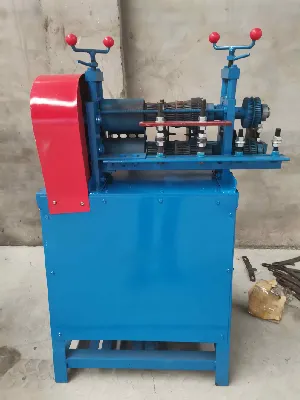

12-р сар . 28, 2024 01:23 Back to list
Metal Recycling Shredder A Key Component in Sustainable Waste Management
In an era where environmental sustainability is becoming increasingly paramount, the recycling of metals has taken center stage. Among the various technologies employed in the recycling industry, metal recycling shredders play a vital role. These machines efficiently process scrap metal, transforming it into reusable raw materials while minimizing the carbon footprint associated with metal production.
Metal recycling involves the collection, processing, and repurposing of metals from various sources. Industries, households, and construction sites generate a significant amount of scrap metal, including aluminum cans, copper wires, steel beams, and more. To recycle these materials effectively, a robust shredding process is essential. This is where metal recycling shredders come into play.
Metal shredders are designed to break down large pieces of metal into smaller, manageable sizes. This shredding process not only facilitates easier handling but also prepares the metal for further processing, such as sorting, melting, and refining. Shredders come in various types and capacities, making them suitable for different applications—from small-scale operations to large recyclers processing tons of scrap metal daily.
One of the primary advantages of using metal shredders in recycling is their efficiency. By reducing the size of the metal waste, shredders enable better sorting and recovery of valuable materials. For instance, metals can be separated from non-metal components more easily after shredding, allowing recyclers to maximize the recovery rate and minimize waste. Additionally, the use of shredders often results in a higher purity level of recycled metals, which is crucial for industries that require high-quality raw materials.

The environmental benefits of metal recycling shredders cannot be overstated. Traditional metal extraction processes are resource-intensive, requiring significant energy and resulting in greenhouse gas emissions. In contrast, recycling metals through shredding and subsequent processing consumes far less energy. According to estimates, recycling aluminum can save up to 95% of the energy needed to produce new aluminum from ore. Furthermore, recycling reduces the need for mining, which can have devastating environmental impacts, including habitat destruction and pollution.
Moreover, shredders contribute to the circular economy—a model that promotes sustainability by reusing and recycling materials. When metal is recycled instead of discarded, it reduces the demand for new raw materials. This not only conserves natural resources but also minimizes the energy and emissions associated with new metal production.
Innovations in shredder technology are continuously emerging, enhancing their capabilities and efficiency. Modern shredders can incorporate advanced features such as automated systems, intelligent sorting technologies, and energy recovery processes. These advancements ensure that metal recycling remains a competitive and environmentally friendly alternative to traditional manufacturing.
In conclusion, metal recycling shredders are indispensable tools in the pursuit of sustainable waste management. By facilitating the efficient shredding and processing of scrap metal, they help reduce environmental impact and conserve valuable resources. As industries and individuals become more aware of their environmental responsibilities, the demand for effective metal recycling solutions—bolstered by shredding technology—will only continue to grow. Embracing this technology not only benefits the economy but also plays a critical role in protecting our planet for future generations.
Latest news
Troubleshooting Common Eddy Separator Problems
NewsJul.04,2025
The Role of Metal Recycling Plants in Circular Economy
NewsJul.04,2025
The Impact of Recycling Line Pickers on Waste Management Costs
NewsJul.04,2025
Safety Features Every Metal Shredder Should Have
NewsJul.04,2025
How Industrial Shredders Improve Waste Management Systems
NewsJul.04,2025
How Cable Granulators Contribute to Sustainable Recycling
NewsJul.04,2025